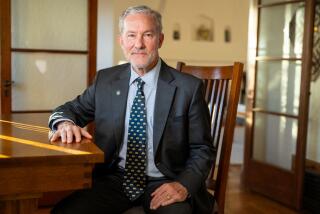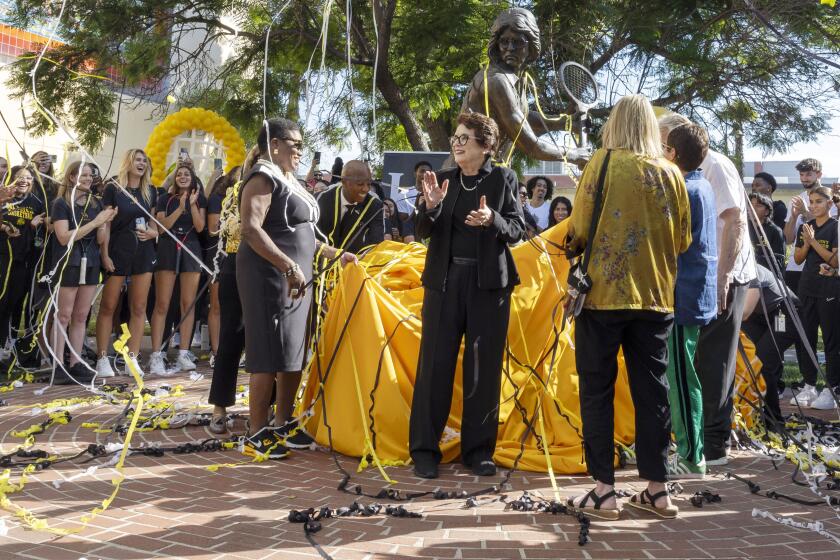
- Share via
For too long, the debate over antisemitism on college campuses has bogged down over whether anti-Zionism is antisemitism. Endless ink has been spilled over the distinction (or not) between the two.
Last week, in their testimony to the House Committee on Education & Workforce, UC Berkeley Chancellor Rich Lyons, City University of New York Chancellor Félix V. Matos Rodríguez and Georgetown interim President Robert M. Groves cut through all this academic hairsplitting. “Is denying the Jewish people their rights to self-determination … antisemitism? Yes or no?” asked Rep. Burgess Owens (R-Utah). All three university leaders replied simply and unequivocally: “Yes.”
The right to Jewish self-determination is a textbook definition of Zionism. The clarity with which the university officials pegged anti-Zionism as antisemitic is much-needed and long overdue.
For years, progressives have raised consciousness about the need to recognize and repudiate bigoted dog whistles, microaggressions and misgendering. Yet many of those same progressives have been shockingly silent when it comes to decrying the macroaggressions of antisemitism that have become increasingly commonplace at anti-Israel protests. They’ve insisted that the now-familiar chants — “From the river to the sea, Palestine shall be free!” “We don’t want no two states! We want all of ’48!”— are not antisemitic, just anti-Zionist, with some who are Jewish concurring and providing cover.
Yet just as there can be “racism without racists” — that is, racist results without racist intents — so too can there be antisemitism without antisemites. Not all anti-Zionists are antisemites, but anti-Zionism, in its most basic form — denying to the Jewish people the right to self-determination, a right recognized as inherent to countless others, including Palestinians — is itself a form of antisemitism.
Moreover, because anti-Zionism singles out the Jewish state alone for elimination — among the dozens of ethnonational or ethnoreligious states in the world, including myriad Islamic ones — that, too, makes it a form of antisemitism.
Declaring anti-Zionism to be antisemitic, as the university leaders did, was an important development for the dignity of Jewish students, one that echoed and amplified a federal district court’s preliminary injunction last year that said UCLA could not allow anti-Israel activists to exclude “Jewish students … because they refused to denounce their faith,” of which Zionism was a central component, from parts of the campus, as happened during protests against the Israel-Hamas war.
Zionism, at its core, is a belief in Israel’s right to sovereignty as a Jewish state on part of the ancestral homeland of the Jewish people. That’s a millennia-old article of faith for Judaism, as reflected, for example, in daily Jewish prayers, the Passover Seder and the ritual of breaking a glass at weddings. Those claiming the mantle of Zionism for far more aggressive or exclusionary aims don’t change that core fact, nor do those treating Zionism as a uniquely malevolent expression of national liberation or nation-building.
Recognizing anti-Zionism as a manifestation of antisemitism is an important step forward for combating the discrimination and ostracism that many Jewish students have experienced for expressing their support for Israel’s right to exist in the face of those who call for its elimination. Such recognition, in turn, can help concentrate campus conflicts about Israel and Palestinians on what matters most: fruitful debate over Israel’s actions (including its prosecution of the war in Gaza) rather than fruitless shouting matches over Israel’s existence and neo-McCarthyite litmus tests (“Are you now or have you ever been a Zionist?”).
As this happens, we would be well-served to cease and desist using the terms “Zionism” and “anti-Zionism,” except as historical artifacts. After all, “Zionism” refers to the aspiration to create a nation that is now nearly 80 years old. And anti-Zionism thus perpetuates a fantasy that Israel’s long-settled place among the family of nations is still open for debate. It isn’t, any more than, say, the existence of Russia under Putin or the United States under Trump, however much we might deplore their policies, is open for debate.
We owe the Berkeley, CUNY and Georgetown leaders a great debt of gratitude for helping to elevate the intractable campus conflicts about Israel and the Palestinians to a higher plane.
Mark Brilliant is an associate professor of history and American studies at UC Berkeley.
More to Read
Insights
L.A. Times Insights delivers AI-generated analysis on Voices content to offer all points of view. Insights does not appear on any news articles.
Viewpoint
Perspectives
The following AI-generated content is powered by Perplexity. The Los Angeles Times editorial staff does not create or edit the content.
Ideas expressed in the piece
- The author asserts that anti-Zionism constitutes antisemitism because it denies Jews the right to self-determination—a fundamental tenet of Zionism—while extending this right to other groups, including Palestinians[1].
- University leaders from UC Berkeley, CUNY, and Georgetown testified before Congress that denying Jewish self-determination qualifies as antisemitism, reinforcing the author’s position that anti-Zionism is intrinsically antisemitic[2].
- Anti-Zionism is framed as discriminatory because it exclusively targets Israel for elimination among the world’s many ethnonational states[3].
- Campus protests using chants like “From the river to the sea” are characterized as antisemitic “macroaggressions,” with progressives accused of silence despite their stance against other forms of bigotry[4].
- The author contends that Zionism is central to Jewish identity, noting its presence in daily prayers and rituals, and rejects criticism of Israeli policies as justification for anti-Zionism[5].
Different views on the topic
- Critics argue that definitions like the IHRA’s conflate antisemitism with legitimate criticism of Israel’s policies, potentially suppressing free speech and advocacy for Palestinian rights under the guise of combating hate.
- Equating anti-Zionism with antisemitism risks falsely inflating antisemitism statistics by including political dissent, as seen in ADL reports post-October 2023.
- Executive actions codifying such definitions, like Trump’s 2025 order, raise First Amendment concerns by treating protected political speech (e.g., calling Israel a “racist endeavor”) as hate speech.
- Opponents warn that conflating Jewish identity with Zionism inadvertently paints all Jews as targets for anti-Zionist activism, endangering Jewish communities.
- Some Jewish voices reject the Israeli state’s policies while affirming Jewish self-determination, illustrating that anti-Zionism isn’t inherently antisemitic but a critique of state actions.
A cure for the common opinion
Get thought-provoking perspectives with our weekly newsletter.
You may occasionally receive promotional content from the Los Angeles Times.









